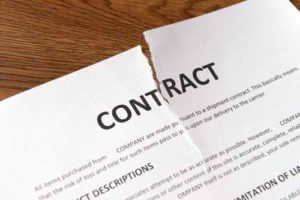
Contracts represent a cornerstone of commercial interactions. Although business relationships are built on trust, that trust is formalized and protected by the terms of a contract – an agreement, usually written, that sets out each party’s responsibilities and what they will receive when they fulfill those responsibilities (the consideration).
Thousands of contracts are made throughout North Carolina every day, and most of them are honored. When a contract is broken or breached, however, the results can be damaging to both parties.
If you’re dealing with a breach of contract, you need someone on your side with the practical experience and legal knowledge to be Strong for You. The Eastern North Carolina business dispute attorneys at The Armstrong Law Firm, P.A. can stand up for your legal rights in a contract dispute.
What is a Breach of Contract?
A breach of contract occurs when one party fails to live up to any of its promises as stated in a contract, or interferes with the other party’s ability to fulfill its promises under the contract, without legal justification for the failure or interference. A breach of contract case may also be based on a failure to meet industry standards or to meet the requirements of any express or implied warranties on a product or service.
In order to determine whether a breach of contract occurs, an experienced business dispute attorney will often review a situation with the following questions in mind:
- Did a valid contract exist? Although most contracts are written, some oral contracts are also valid. In general, a contract exists if there was an offer, the offer was accepted, and both parties will receive some form of consideration that has value to them.
- If there is a contract, what does it require each party to do? These are often known as the “terms” of the contract. They may be as simple as “if you pay us the amount shown on the price tag, we will deliver this product,” or they may be considerably more complex.
- Was the contract modified at any point? If so, what modifications were made? Modifications can affect not only the portion changed, but the operation of the entire contract.
- Did the breach of contract actually happen as described? Did one party fail to live up to its obligations, and if so, how?
- If the breach happened, was it material to the contract? Not all breaches go to the heart of the matter when it comes to a contract. Often, the contract’s goals can be fulfilled even if one party missed a few particulars.
- Does the breaching party have a legal defense against the enforcement of the contract? In other words, does the law allow the breaching party to “get away with” breaching the contract – or is there no reason they should not be held to their end of the bargain?
- What damages resulted from the breach? What has the failure to honor the agreement cost the other party – in time, money, opportunities, or other losses?
What is a Material Breach?
A breach is “material” if it causes the non-breaching party to receive something substantially different from what the contract promised. For instance, a company that agrees to ship 500 golf balls to its purchaser but instead ships 500 footballs has likely committed a material breach. The purchaser has received something very different from what they ordered.
In some business dispute cases, a material breach results in a complete failure of the non-breaching party to receive anything they were promised under the contract – for instance, if the breaching party promised to ship 500 golf balls, but never made the shipment at all.
A breach that is not “material” may be considered “minor.” A minor breach is one that does not prohibit the other party from receiving the consideration they were promised by the contract. For instance, in a contract for the sale and purchase of golf balls, if the breaching party agreed to ship 500 golf balls in cardboard boxes but instead shipped them in wooden boxes, the breach would likely be considered minor, unless the contract specified that the cardboard boxes were essential to the transaction.
The difference between a material breach and a minor breach often depends on the context of the contract itself. Contracts must clearly state which terms of the transaction they cover are essential and which are not. Your attorney can help you sort through the details of the contract to ensure that all material terms are clearly marked.
Legal Remedies for a Breach of Contract
The difference between a material and a minor breach can have profound consequences for the legal remedies available. When a breach is material, the non-breaching party may “step out” of its own obligations under the contract in most cases. When a breach is minor, the non-breaching party is still generally expected to fulfill its own contract obligations, but it may also sue the breaching party for damages that were caused by the breach.
If one party is threatening to breach a contract but has not actually done so, your attorneys can work to pursue an injunction that will prohibit the other party from breaching the contract under pain of legal penalties. If the breach has already occurred, your attorneys can help you determine which legal remedies are best suited to your needs.
Common legal remedies in breach of contract cases include:
- Specific performance. The court orders the breaching party to hold up its end of the contract. A demand for specific performance is not available in all contract cases.
- Money damages. Damages are the most common form of legal remedy after a breach of contract. They may include payments to compensate for loss of expectation (the lost gain expected under the contract), the non-breaching party’s reliance on the contract, or restitution to reimburse the non-breaching party for any money or benefits it spent under the contract.
Our Attorneys Are Ready to Be Strong for You
At The Armstrong Law Firm, P.C., our attorneys combine a small-town law firm feel with the practical experience and legal knowledge we need to be Strong for You. Contact us today to learn more about how we can help you and your business resolve a contract dispute or any business disputes.


 Contracts represent a cornerstone of commercial interactions. Although business relationships are built on trust, that trust is formalized and protected by the terms of a contract – an agreement, usually written, that sets out each party’s responsibilities and what they will receive when they fulfill those responsibilities (the consideration).
Contracts represent a cornerstone of commercial interactions. Although business relationships are built on trust, that trust is formalized and protected by the terms of a contract – an agreement, usually written, that sets out each party’s responsibilities and what they will receive when they fulfill those responsibilities (the consideration).








